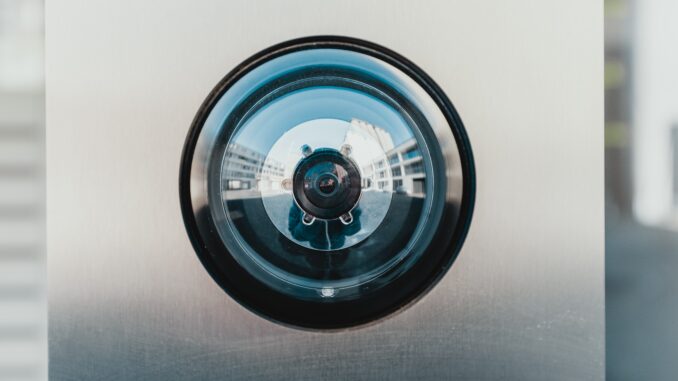
The surge of home rental services like Airbnb has revolutionized holiday experiences, but concerns arise with instances of hidden cameras in rental properties.
A Texas couple, Kayelee Gates and Christian Capraro, staying at Christopher Goisse’s vacation rental in Maryland, discovered disguised cameras during intimate moments.
Noticing apparent cameras in smoke detectors above the bed and in the bathroom, they exposed a recording device.
The incident led to feelings of embarrassment and humiliation for Ms. Gates, highlighting the potential dark side of staying in strangers’ homes. Such occurrences raise questions about the safety of these popular lodging options.
AirBnb
In the past decade, the landscape of travel and accommodation has undergone a remarkable transformation with the advent of Airbnb. Founded in 2008 by Brian Chesky, Joe Gebbia, and Nathan Blecharczyk, this platform has evolved from a modest startup to a global hospitality phenomenon, fundamentally changing the way people experience and perceive travel.
At its core, Airbnb is an online marketplace that connects travelers with local hosts, offering a diverse range of accommodations, from private rooms to entire homes.
What sets Airbnb apart is its emphasis on creating unique and personalized experiences for users. It goes beyond traditional hotels, enabling individuals to immerse themselves in the local culture by staying in homes reflective of the destination’s authenticity.
One of Airbnb’s key strengths is its ability to cater to various budgets and preferences. Travelers can choose from a spectrum of options, whether they seek a cozy room for a solo adventure or an entire villa for a family vacation.
This versatility has democratized travel, making it more accessible to a broader demographic.
The platform’s success can be attributed to its community-driven approach. Hosts are not merely landlords; they become ambassadors, providing guests with insider insights into the best local spots and hidden gems.
This personal touch fosters a sense of belonging, turning a stay into an immersive experience. Furthermore, reviews and ratings create a sense of accountability, encouraging hosts to maintain high standards, ensuring the safety and satisfaction of guests.
However, the rise of Airbnb has not been without challenges. Concerns about safety, privacy, and potential misuse of properties have surfaced. Incidents like hidden cameras in rentals, as reported by some guests, underscore the need for vigilance and regulation in the sharing economy.
As Airbnb continues to redefine the hospitality industry, it faces ongoing scrutiny and regulatory adjustments worldwide. Striking a balance between innovation and responsibility remains a crucial aspect of its journey. The platform’s commitment to adaptability and addressing community concerns will be pivotal in sustaining its global impact.
In conclusion, Airbnb has undeniably revolutionized travel by offering a unique, community-driven alternative to traditional accommodations.
While challenges persist, its influence on the way people explore the world is undeniable. As Airbnb celebrates its success on its birthday, it stands as a symbol of the evolving landscape of travel, promising exciting possibilities for the future of hospitality.
How to spot a home hidden camera
Detecting hidden cameras in a home can be a privacy concern for many individuals. While it’s not always easy to spot these devices, there are several methods you can use to increase your chances of identifying hidden cameras:
1. Physical Inspection:
- Unusual Objects: Hidden cameras can be disguised as everyday objects. Look for anything that seems out of place, such as smoke detectors, alarm clocks, or wall outlets.
- Red or Green Lights: Some cameras may have indicator lights. Turn off the lights in the room and inspect for any small, blinking lights, which could indicate a hidden camera.
2. Check for Reflective Surfaces:
- Camera Lens Reflection: Shine a flashlight around the room and carefully inspect reflective surfaces, such as glass or plastic. Camera lenses may reflect light, revealing their presence.
3. Wireless Signal Detection:
- Signal Scanning Apps: Use a smartphone app that detects wireless signals. Some hidden cameras transmit wireless signals, and these apps can help identify unusual signals in the area.
- Wi-Fi Network Scan: Check your Wi-Fi network for unknown or suspicious devices. Hidden cameras with wireless capabilities may appear as connected devices on your network.
4. Infrared Detection:
- Night Vision Detection: In a dark room, use a smartphone or digital camera to check for any sources of infrared light. Many cameras use infrared technology for night vision, and this light may be visible through the camera lens.
5. Listen for Unusual Sounds:
- Electronic Buzzing or Clicking: Some hidden cameras produce faint buzzing or clicking sounds. Turn off all electronic devices in the room and listen for any unusual noises.
6. Motion Detection:
- Move Around the Room: Some hidden cameras activate when they detect motion. Move around the room and observe if there are any sudden changes or movements in the environment.
7. Use a Camera Detector:
- Radio Frequency (RF) Detectors: These devices can pick up radio frequencies emitted by wireless cameras. Sweep the room with an RF detector, and it will indicate any signals that may be coming from hidden cameras.
8. Hire Professionals:
- Professional Sweeps: If you have serious concerns or are unable to identify hidden cameras on your own, consider hiring professionals who specialize in electronic counter-surveillance. They use advanced equipment to detect hidden devices.
9. Check Common Areas:
- Bathrooms and Bedrooms: These are common areas for hidden cameras due to the expectation of privacy. Pay extra attention to these spaces during your inspection.
It’s important to note that some hidden cameras are very small and may be challenging to detect with the naked eye. Regularly checking your surroundings and being vigilant can help address privacy concerns. If you believe you have found a hidden camera, it’s crucial to respect privacy laws and report any illegal surveillance to the appropriate authorities.

